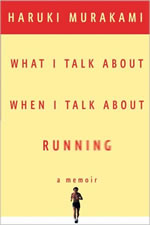
Everytime when I travel, I bring along books to read and a notepad to write. For I don’t stop reading or writing, especially not during my holiday. I had almost finished reading the new book by Paulo Coelho before I boarded the plane so I reckon, I probably needed at least three books to last the two weeks trip.
One thing I really enjoy writing a book summary is the occasion comments I read – both here and in Facebook – from other passionate readers who may or may not see the book the way I do. And we exchange thoughts. Prior to my holiday trip, I have read Haruki Murakami’s new non-fiction book. As always, I shared my thoughts online. That sparked off an online dialogue with another fan of Murakami which in turn inspired me to pick two random books of his from Kinokuniya. “South of the Border, West of the Sun” is the fourth Murakami book I have read. And I enjoy every single page of it – 187 in total.
“South” in essence is a story of romance told from the perspective of a man, from his relationship with his childhood sweetheart, the in-between love affairs, to his marriage. A typical story that almost all men who have fallen in love can relate. An ordinary love template. The details – both physical and emotional – are so vivid that I was brought back in time as a young boy, to the beginning of my fascination to the opposite sex, to the silly things I did driven by my then raging hormone. However simple the idea is, a story told by Haruki Murakami is never going to be a typical story. “South” is original; it is genuine; it touches my heart. I reflect upon my own love relationship, from my mid-teen (I mature late) till today. It is one book that I would read again. That’s why I bought the Spanish version during our holiday in Spain. And I am looking forward to reading both versions side-by-side.
I am probably slightly ahead of time to compare “South” with another earlier work of his “Norwegian Wood” – as that will be my upcoming book summary. Both novels are of a similar topic, with a center character that strongly resembles the author himself (I make that observation based on his semi-autobiography “Running”). His later works certainly get more and more surreal and abstract. A good example is his recent work “After Work”. On that note, “South” to me, has a subtle surreal after taste. It makes me ponder upon what is real, and what is not.
Below is a short quote of what I feel as a beautiful way to put forth something so close to reality, something that appears so real to me today.
“No one will weave dreams for me – it is my turn to weave dreams for others. That’s what I have to do. Such dreams may have no power, but if my own life is to have any meaning at all, that is what I have to do.” – South of the Border, West of the Sun by Haruki Murakami (translated by Philip Gabriel)


